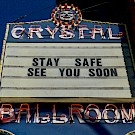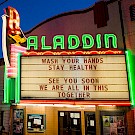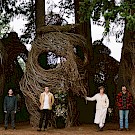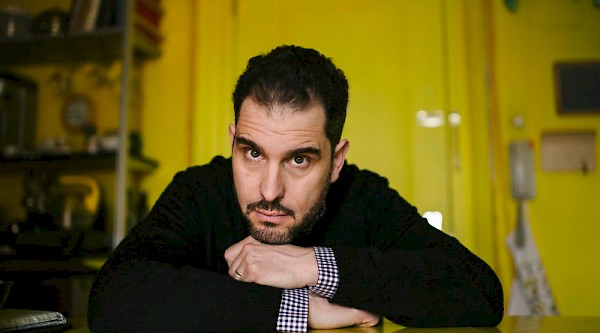 Charlie Hunter may not quite be a household name, but some of his fans certainly are. Wielding a renowned talent for simultaneously balancing driving bass grooves with independent melodic and lead figures on custom seven- and eight-string guitars, Hunter has been sought for high-profile work with D’Angelo, Frank Ocean, Norah Jones, Christian McBride and Snarky Puppy. John Mayer, who collaborated with Hunter on 2007’s Continuum, was reportedly a regular presence at Hunter’s Boston-area gigs while still a Berklee student.
Charlie Hunter may not quite be a household name, but some of his fans certainly are. Wielding a renowned talent for simultaneously balancing driving bass grooves with independent melodic and lead figures on custom seven- and eight-string guitars, Hunter has been sought for high-profile work with D’Angelo, Frank Ocean, Norah Jones, Christian McBride and Snarky Puppy. John Mayer, who collaborated with Hunter on 2007’s Continuum, was reportedly a regular presence at Hunter’s Boston-area gigs while still a Berklee student.
Hunter, however, is largely an autodidact. A former pupil of Bay Area shred legend Joe Satriani—who also trained Steve Vai and Metallica’s Kirk Hammett—Hunter honed his craft busking on the streets of Paris in the late 1980s before returning stateside to join Michael Franti in The Disposable Heroes of Hiphoprisy. Yet, he is widely capable of extending his approach and vocabulary to encompass the complex harmonies and rhythmic nuances of modern jazz, which he complements with deft blues phrasing and funk’s palpable feel. In fact, much of Hunter’s 1990s discography was released on Blue Note Records, the talismanic New York jazz imprint.
Most recently, Hunter’s gaze has been fixated squarely on the blues, an affinity he attributes to his mother’s taste for the likes of Mississippi John Hurt and Lead Belly. Speaking with National Public Radio last year, Hunter quipped that, even when it was “incredibly embarrassing” to have friends over while his mom was playing old blues records, they were nevertheless “the soundtrack to our youth.” Hunter continues to explore this path—and his flair for wry album titles—on Everybody Has A Plan Until They Get Punched In The Mouth, his first quartet record since 2001’s Songs From The Analog Playground, this time projecting a sharper, Albert King-esque stylistic approach on songs like “No Money, No Honey” and “We Don’t Want Nobody Nobody Sent.”
Now joined by cornetist Kirk Knuffke, Hunter will be performing to a sellout audience at Portland’s Mississippi Studios on Friday, December 9. Interviewed in advance of this appearance, Hunter talks Everybody Has A Plan..., discussing the quartet format and Knuffke’s addition before turning to the state of music’s popular credibility and the formidable monolith confronting today’s generation of musicians.
Everybody Has A Plan... was a lot of fun to listen to. The hard blues sound suits you really well and I got the sense you guys were having a good time playing as well.
Oh, sure!
When was the last time you played with a quartet?
It’s been years. It’s not the smartest thing in the world because it guarantees that I lose money. [Laughs]
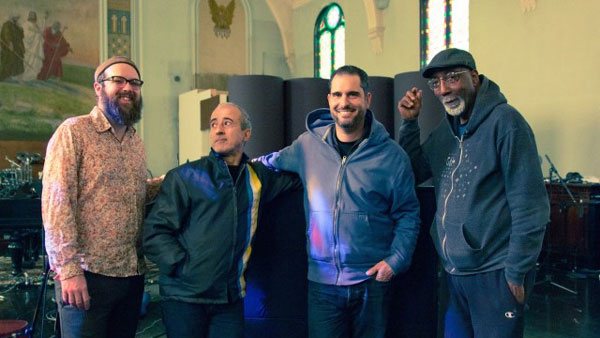 Charlie Hunter and his quartetLike using the diminished scale, as Scott Henderson said?
Charlie Hunter and his quartetLike using the diminished scale, as Scott Henderson said?
Yeah, exactly! [Laughs] Not the smartest move, but I just felt like I was dumb enough to do a record that was a quartet record, so I kind of have to, at least, bring a quartet of some kind. Of course, it’s not the one on the record. The only guy I have from the record is Kirk Knuffke, but Scott Amendola is on drums and I have this really great sax player named Kasey Knudsen. And it should be fun. I’m definitely looking forward to the hang.
Did you have a quartet format in mind when you were writing? Or did it just become apparent as you were going along?
Yeah, I envisioned it as a quartet record for those specific people; it’s just kind of where I was coming from. You know, a lot of it is about the two-horn arrangements and you’ve kind of gotta do it that way. But note to self: Only make trio records from now on.
But I gave that note to myself like 10 years ago and I’ve broken that note like two or three times, so…
Everyone has to remind themselves of things like that once in awhile.
I think so.
Have you worked with Kirk [Knuffke] in the past? Or was this the first time?
No, we played a bunch of gigs together and it was fun, and I thought, “Wow, this guy’s got a great vibe and a great sound and let’s do this!”—you know? Basically, it’s really the same trio I had with Curtis [Fowlkes] and Bobby [Previte] for a while, and I just added him to the mix.
What scene does he come out of? Is he a New York guy?
Yeah. He’s originally from Denver, but he’s been in New York for five or six years—or maybe longer at this point. I’m not sure. He’s definitely been in the scene. He plays with the great drummer Matt Wilson.
Dan Balmer, a great local player, actually did an album with Matt [Thanksgiving].
Dan Balmer? Yeah, he’s a great guitar player, man. So I just kind of hooked him [Knuffke] up to do this, and there we go!
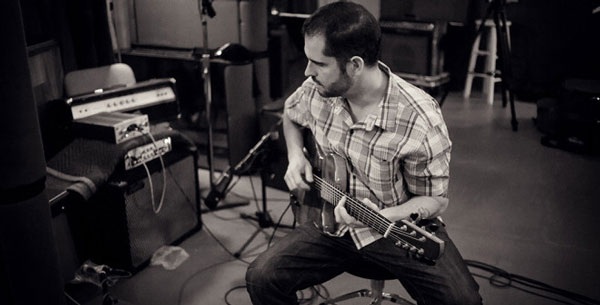 When you went into the studio, did you have a clear idea of where you wanted the album to go? Or did you just present the songs, hit record and roll with it?
When you went into the studio, did you have a clear idea of where you wanted the album to go? Or did you just present the songs, hit record and roll with it?
No, I had very specific arrangements. And that’s the good thing about having [drummer] Bobby Previte on any record; he’s just such a composer and his arranging thing is really off the chain. If you bring it in, he’ll definitely polish the living hell out of your turd for you. [Laughs]
I’d give the album more credit than that. [Laughs] Is it difficult to strike that balance as a bandleader? Between getting things the way you want them while stoking the creative vibe and not overly restraining the other musicians?
You definitely want to have a balance between those things. I think it really ultimately ends up being, “Who are the people you picked to make the record with?” I can understand if you make a record with people like Bobby Previte and Curtis Fowlkes and you’re like, “These are our elders.” If you get 20-year-olds in your band, you can say, “Do your best to sound like this.”
But, generally, I even would shy away from that because you really just have to hear someone play and hear where they’re coming from. And then just let them know what the music is. After that, you really shouldn’t have to say anything. That’s about as hands-on as I want to get. I just want them to show up and do their thing.
On the guitar, did you feel like you had to make a conscious effort to accommodate a fourth person, or were you able to play pretty freely?
I just try to do the same thing I do with every record, which is not suck too much. [Laughs] I go into with the same attitude: Try not to suck too much and then some good shit occasionally happens. [Laughs]
You threw down on “No Money, No Honey!” [Laughs]
It’s so funny; people like that one. That’s a tune I wrote in five minutes! But it’s like, “You like that? I’ve got play that damn thing now? Alright, fair enough.” [Laughs]
Some of the best stuff on record was done on the spot like that!
That’s totally right, man. That’s totally true.
The last time we talked, you’d said that the biggest challenge facing the present generation of musicians lies in finding a place amidst a grossly over-saturated music market. Has that path gotten any clearer?
I mean, it’s interesting. When I look at what those guys in Snarky Puppy have done, it’s pretty impressive. Mike League is kind of the de facto leader of that thing, although it really is a one-for-all, all-for-one kind of vibe. Those guys really work together, and they really work hard, and you didn’t have anything like that in my generation so much, because everyone was an entity and there was enough opportunity, and it led to people trying, “This is my thing; this is my thing.”
With those Snarky Puppy guys, they’re all doing their own things, but they’re working really hard to make something happen. They have this great community. You know, they’re the younger generation and maybe more people will attempt that model. I just don’t know how many gigantic groups and organizations that model can handle.
I believe Jason Isbell recently remarked that it’s likely we’ll see a larger middle class in music now that artists can sidestep record companies and operate more independently.
Yeah, I think so. But I don’t even think it’s a middle class. I think it’s mirroring how society at large is right now. It’s really more about the 1 percent. Everybody else just gets the leavings, basically. I just don’t think there is any middle class anymore, unfortunately. I can tell you that I am firmly not in the 1 percent—not even in the 25 percent. I don’t think I’m even in the 50 percent, you know? [Laughs]
A friend who plays professionally recently said that the going rate in town can be as low as $30 for a three-hour gig, so I’m sure there’s a lot of truth to what you’re saying. On the flipside, artists now have more nominal independence and direct marketplace access.
It’s just so hard to say. I came into this business when there was still some residue from the way people had been doing it for many years. So I kind of came in on that and based my whole thing on it. But I knew these punk rock musicians and blues musicians who just spent all their time traveling around the country, so, I thought, “I have to find a way to make this work for me, also.” I did that, and then all of a sudden I was moderately successful in that universe. Then the whole thing changed around 2001 or 2002. I tried to figure out how to deal with that. With the financial crisis and the meltdown in 2008, again it changed and I had to figure that out. I figured it out and then it changed again. So, it’s really been in kind of a state of flux for the last 20 years or so, and that’s really tricky.
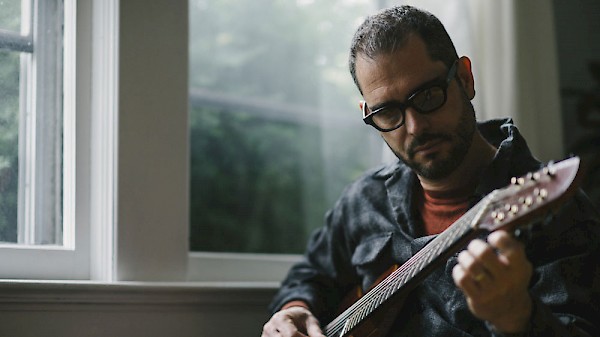 But I think if anyone can course correct, it’s a musician, because we spend all of our time just working so, so hard and pushing a van uphill with the brakes on. Almost nobody in any other industry has the dedication that we have. We’re just constantly working on our instrument, and writing, and our craft, whatever it may be. I’ve felt so extremely lucky just being part of a cohort that has these people who are so driven and who go into the shed every day and put in the time regardless of whether everyone thinks they’re the neatest thing since Swiss cheese or if nobody knows them. We’re the hardest working group of people that I know of. Because of that, we’re able to course correct better than almost anybody.
But I think if anyone can course correct, it’s a musician, because we spend all of our time just working so, so hard and pushing a van uphill with the brakes on. Almost nobody in any other industry has the dedication that we have. We’re just constantly working on our instrument, and writing, and our craft, whatever it may be. I’ve felt so extremely lucky just being part of a cohort that has these people who are so driven and who go into the shed every day and put in the time regardless of whether everyone thinks they’re the neatest thing since Swiss cheese or if nobody knows them. We’re the hardest working group of people that I know of. Because of that, we’re able to course correct better than almost anybody.
But the fact of the matter is that there is such a tiny little slice of pie for all of us to split that it generally ends up being the 1 percent that gets the majority of the pie. The people who are left scrabble for what’s left. It’s a testament to how cool we are with each other that there aren’t more family feuds, because there’s just so little opportunity to go around.
In light of the election, I’ve been thinking a lot about if music will respond; or if it even can. Do you think music still possesses the social capital to make an impression anymore?
Hopefully, it does. I think, really, the point is people needing to get out of their bubbles and meet other people, you know? I think that that’s a really important aspect of what’s going on. I think if you do that and play music that brings people together, you’re already part of the solution. I think we’re all so incredibly compartmentalized into our own zones.
Right.
And people stay in their bubbles. We’re all guilty of it. But yeah, I don’t know. Keep on keeping on. That’s about all you can do.
Have there been any records that have summed up your feelings about the election or the events leading up to it?
You know, I haven’t really thought about it. I grew up in a very, very left-wing town at a very, very left-wing time. So, I’ve been through all of that stuff. All the music that I listened to has that in it. If it’s Louis Armstrong, it has that in it, you know? It’s just automatically included in it. If it’s Son House, it’s there. If you’re listening to The Staple Singers, it’s in there.
Music’s political qualities don’t have to be overt.
Exactly. And a lot of times, the stuff that’s not as overt is the stuff that has the biggest impact, anyway.

